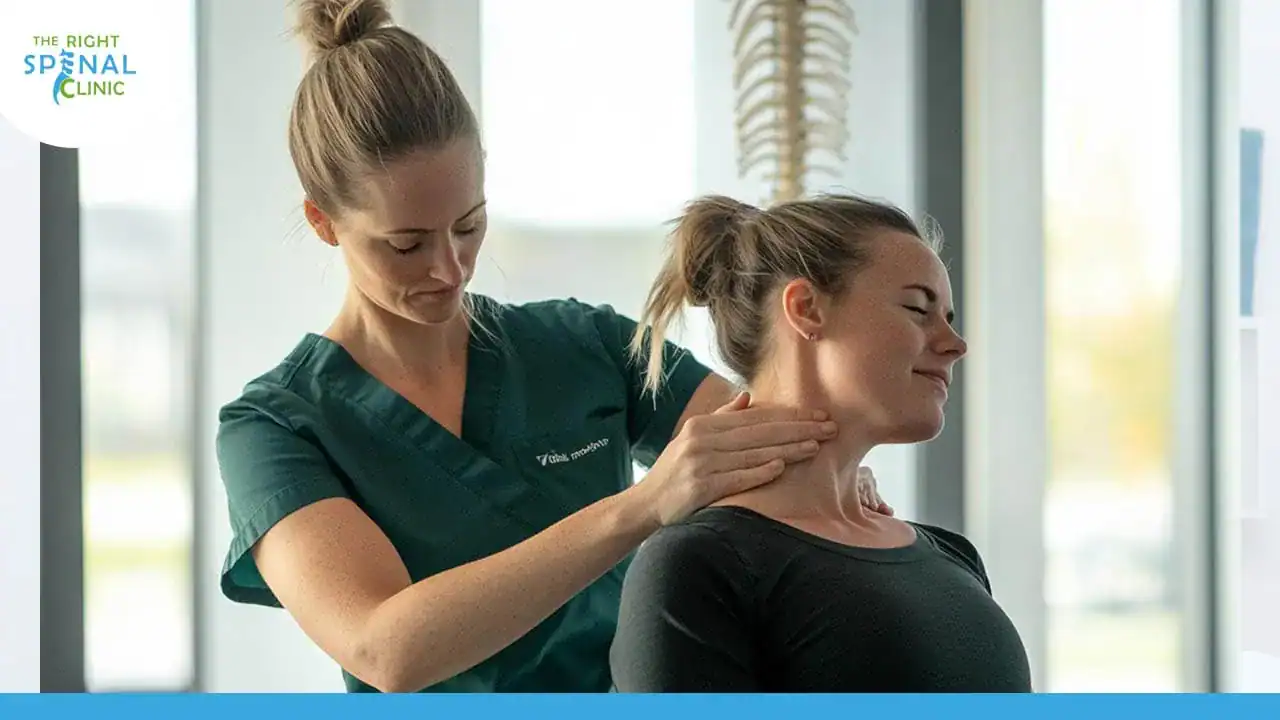
Whether your pain stems from poor posture, overuse, or an injury, physical therapy can help you move better and hurt less — without relying on medication or surgery. In this guide, we’ll break down what causes neck and shoulder pain, how physical therapy helps, and what a treatment plan might include.
Causes of Neck and Shoulder Pain
The most common causes of neck and shoulder pain include sprains and strains from physical activity, overuse, or poor posture. However, chronic or severe pain can also stem from deeper issues.
Want to understand how physical therapy addresses pain at the source? Visit our physical therapy services in Tampa for a full breakdown of techniques and benefits.
Common Causes
- Muscle overuse or tension
- Whiplash or traumatic injury
- Spinal misalignment
- Joint degeneration (arthritis)
- Soft tissue damage (tendons, ligaments)
- Poor posture or ergonomics
- Nerve compression or inflammation
Common Shoulder Injuries
Shoulder pain is often caused by repetitive motion, injuries, or instability in the joint.
- Dislocation – when the upper arm bone pops out of the shoulder socket
- Rotator cuff tear – damage to the muscles/tendons that support the shoulder
- Impingement – when the shoulder blade rubs against soft tissue
- Bursitis – inflammation of the fluid-filled sac in the joint
- Labral tear – cartilage damage around the socket
- Frozen shoulder – joint stiffness and reduced mobility
Learn more about how physical therapy helps after a car accident if your pain started with trauma or a crash.
Types of Neck Pain
Neck pain is typically classified into these common categories:
- Mechanical neck pain – due to joint or soft tissue strain, often posture-related
- Neuropathic neck pain – nerve-based, sometimes radiating into arms or upper back
- Central neuropathic pain – related to the spinal cord or central nervous system
Symptoms of Neck and Shoulder Pain
Neck Pain Symptoms
- Stiffness or limited range of motion
- Sharp or stabbing pain
- Pain radiating into arms or upper back
- Headaches triggered by neck movement
- Discomfort when turning or tilting the head
Shoulder Pain Symptoms
- Weakness in the arm or grip
- Pain when lifting, reaching, or lying on the shoulder
- Tingling or numbness
- Warmth or redness in the joint
- Limited motion or tightness
For long-term pain or recurring symptoms, physical therapy can provide safe, personalized care — no referral required. Start your recovery here.
Neck and Shoulder Pain Diagnosis
Our physical therapy team may use advanced diagnostics like X-rays, MRI, or EMG — but your recovery starts with listening to your symptoms, movement testing, and building a plan based on what you need most.

How Physical Therapy Helps Reduce Pain and Other Symptoms
Physical therapy Tampa is one of the best treatments for chronic pain. It can help reduce neck pain and alleviate other symptoms. The objectives of physical therapy are to help patients regain their strength, improve mobility, and feel better.
At The Right Spinal Clinic, our physical therapists don't just treat neck pain or shoulder pain. We also focus on the source of your symptoms. Our team will assess every area to find out the actual cause of your neck pain or shoulder pain. Once determined, we can now devise a personalized treatment plan tailored to fit your goals and condition.
Physical Therapy Treatment Plan
Here's what to expect from your physical therapy sessions:
- Low-impact aerobic training
- Strengthening exercises
- Manual therapy for neck pain
- Massage therapy
- Electrical stimulation
- Lifestyle counseling
- Ultrasound
- Ice packs
Advantages of Physical Therapy for Shoulder and Neck Pain
Physical therapy for the neck and shoulders can provide you with several advantages. Here are some of them:

Reduces Inflammation
Targeted exercises and manual therapy help reduce pain and swelling during your recovery. You may also receive guidance on inflammation-reducing habits.
Reduces Strain
Physical therapy for neck strain depends on the severity of the condition. For instance, the treatment program may include therapeutic exercises like neck rotation to strengthen your muscles and bone structures.
Our team may also perform soft tissue mobilization to the affected joints. Other physical therapy techniques that can help reduce strain include heat or ice therapy to control the swelling and reduce pain or discomfort.
Improves Blood Flow
Other problems, including poor circulation, often accompany neck pain. Physical therapy for neck pain and shoulder pain can also treat poor circulation. Our team can help facilitate proper circulation in the neck, shoulders, and throughout the body. This can be achieved through massage therapy, proper stretching, and low-impact exercises.
Increases Neck and Shoulder Strength
In addition to shoulder and neck pain relief, our physical therapy programs are also designed to increase strength through active exercises. These exercises include neck and shoulder stretching, core and back strengthening, aerobic activities, and aquatic exercises.
Increases Neck and Shoulder Flexibility
Our physical therapists may also recommend mobility exercises and stretches to improve mobility and flexibility. The first few sessions only involve basic stretching to relieve nerve pain and tension. Your physical therapist will eventually recommend more exercises to improve your range of motion.
The Right Spinal Clinic: Proven Tampa Physical Therapy Programs
Don’t let neck or shoulder pain control your life. Our licensed physical therapists are ready to help you heal naturally — with no referral needed and many major insurance plans accepted.
📞 Call (813) 392-2164 or Schedule Your Appointment.
🕒 Walk-ins welcome | Se habla español
Frequently Asked Questions
Q: How does physical therapy help relieve neck and shoulder pain?
A: Physical therapy improves posture, strengthens muscle groups like the scapula and rotator cuff, and reduces inflammation through manual therapy, massage, and therapeutic exercise. Patients often experience relief from shoulder pain, neck stiffness, and related symptoms like headache, dizziness, or nerve irritation. Personalized care also helps prevent future injury and supports overall joint health.
Q: Do I need a physician referral to begin physical therapy in Tampa Bay?
A: No, in Florida, you can start therapy without a physician referral. After your initial evaluation at our clinic, a licensed physical therapist will review your medical history and design a plan tailored to your injury, insurance coverage, and goals — whether it’s to restore range of motion or manage chronic back pain, knee discomfort, or soft tissue strain.
Q: What types of injuries or conditions can physical therapy treat?
A: Therapy is effective for a wide range of musculoskeletal and neurological conditions, including neck and shoulder pain, back pain, hip or knee strain, tendonitis, radiculopathy, rotator cuff tears, elbow or wrist injuries, and sports-related trauma. It can also support patients dealing with diseases like rheumatoid arthritis, vertigo, or dizziness by improving gait, balance, and function.
Q: What treatments are used in shoulder and neck therapy sessions?
A: Your treatment plan may include manual therapy, myofascial release, massage, laser stimulation, ultrasound, ergonomic correction, and athletic training techniques. These methods help reduce edema, improve blood flow, and restore motion in affected tissue, cartilage, joints, and bones. We also use guided exercises for posture correction, fall prevention, and functional recovery of the arm, leg, foot, or ankle.
Q: What should I expect during my first physical therapy visit?
A: During your first appointment, a licensed therapist will perform an evaluation of your posture, motion, joint stability, and muscle activation. We’ll review your medical history, accident records, or sport-related injury details, and may use diagnostic tools like ultrasound. Then we’ll build a custom therapy plan — with or without surgery — focused on long-term pain management and recovery.
Q: Is physical therapy covered by insurance?
A: Most health insurance plans — including PIP for accident-related injuries — cover physical therapy. Our clinic accepts many major plans. Contact us to verify your benefits.
Recent Posts









